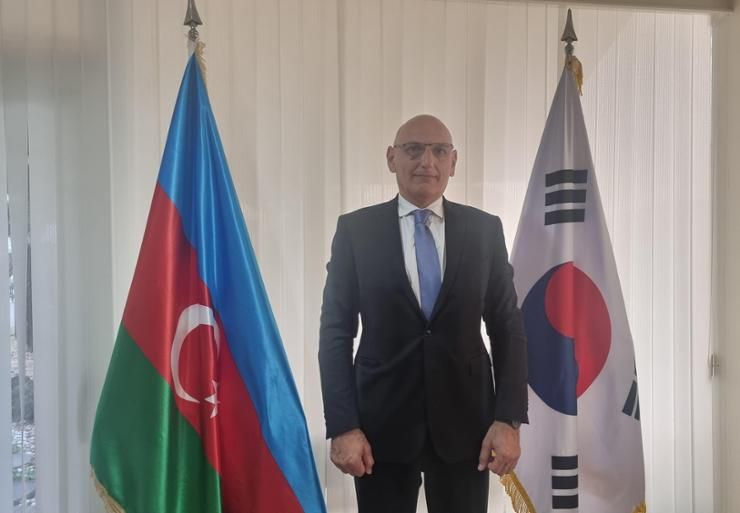WNAM REPORT: The landmine problem created by Armenia in Azerbaijani territory is one of the bitter consequences of the long-standing conflict between the two countries. During and after the Garabagh conflict, Armenia significantly threatened regional security by planting landmines on Azerbaijani soil and failing to hand over accurate maps of mined areas to Baku. Notably, in February of this year, Yerevan handed over mine maps to Azerbaijan, which were later found to be inaccurate.
In his interview, Elchin Amirbayov, the Azerbaijani president’s special envoy said that Azerbaijan is seeking increased support from Korea in its ongoing demining efforts, which have become critical since the end of the conflict with Armenia.
“Azerbaijan is seeking increased support from Korea in its ongoing demining efforts, which have become critical since the end of the conflict with Armenia. The conflict, which ended a ceasefire in November 2020, left large portions of Azerbaijan’s territory heavily contaminated with landmines and unexploded ordnance,” he said.
“Another big area where we expect Korea to assist us is the issue of demining because the areas, which were affected by the conflict — and we are talking about 12 percent of our territory, have been heavily contaminated by landmines and unexploded ordnance,” Amirbayov noted.
Despite the cease-fire being in place for nearly four years, Azerbaijan has managed to clear only 13 percent of the contaminated areas, leaving 87 percent still posing a danger.
“We have to deal with 1.5 million landmines which were planted by Armenians throughout these years. They refuse to provide us with mine maps or correct mine maps, so we don’t know where those mines are concentrated, which brings us an ever-increasing human toll,” he added.
“After the ceasefire, the number of mine victims has reached 377 up until today, and I think the 378th person got wounded today because he stepped on a mine. Out of those, 69 have died,” Amirbayov said.
He stressed that this issue is both a “human security issue and a big humanitarian issue” as the government aims to return 800,000 internally displaced persons to their homes in the affected areas.
“So far, we have only been able to bring back roughly 8,000 people because the territories are heavily mined. You cannot bring people back unless you are sure that the land is safe,” Amirbayov said.
Amirbayov expressed disappointment that Korea has not yet been a leading donor in Azerbaijan’s demining efforts, despite its strong track record of supporting similar initiatives in other countries, such as Laos, Vietnam, and Cambodia.
“Korea has not been very active in this area for us, although we believe that you have a very good record of assisting other countries who suffer. We hope that the Korean government can continue providing more robust support to us because it’s about helping post-conflict peacebuilding efforts,” he said.
Regarding the type of support Azerbaijan is seeking, Amirbayov explained that financial support for capacity building and equipment is crucial.
“We have enough people who are mobilized, but what we lack is the human capacity of trained people. That is also something important, but also technologies in the demining area are developing so fast. Now we have special equipment like drones which can detect mines from a distance,” he said, highlighting the need for advanced technologies and training.
He also mentioned the importance of discussing regional security issues with Korea, especially as the country begins its two-year term as a non-permanent member of the United Nations Security Council.
“We thought it would be interesting for our Korean partners and colleagues to get the Azerbaijani perspective on the peace process between Armenia and Azerbaijan and establish channels of communication on this issue between our capitals,” he said.
When asked about Korea’s role on the UN Security Council regarding the Armenia-Azerbaijan peace process, Amirbayov clarified that both countries have opted for a bilateral negotiation format.
“We do not expect any international organization or third party to play a direct role, except in supporting the two nations on their journey towards peace,” he said.
“We are very close with Armenia to finalizing a peace agreement, but we need to ensure this peace is sustainable. The remaining obstacle is Armenia’s constitutional territorial claim on (the) part of Azerbaijan. Once that is resolved, we can move forward.”
Economic cooperation
Amirbayov highlighted the strategic importance of Korea-Azerbaijan relations, emphasizing the potential for expanded cooperation in energy, trade, and regional security.
“First, this is a good opportunity to continue the political dialogue between our two countries. We consider the Republic of Korea a key partner in this region, and there is significant potential to go beyond traditional fields of cooperation, such as energy, and explore new areas.”
“Azerbaijan is exporting various fossil fuels, including oil products and LNG, to Korea. But even in energy, there is untapped potential for cooperation in renewable energies,” he said. He highlighted Azerbaijan’s resources in wind, solar, and hydropower, noting the country’s transition from fossil fuels to green energy.
Expanding on the economic ties, he mentioned the geo-economic significance of Azerbaijan, which lies on critical trade routes between Asia and Europe.
“In the current geopolitical context, with the conflict between Russia and Ukraine affecting traditional routes, the Middle Corridor — replicating the ancient Silk Road — has gained importance. We see this as a significant area for potential cooperation with Korean logistics companies,” he said.
Regarding trade, Amirbayov revealed that bilateral trade in the first half of 2024 had reached over $200 million, but emphasized the potential for much more.
“With the new geopolitical realities, there’s room for enhanced cooperation. We hope to see more Korean investments, especially in the liberated areas of Azerbaijan, which offer opportunities in green energy and reconstruction.”
This is Amirbayov’s first visit to Korea, which gives him the opportunity to engage with the country on a new level.
“It’s a good opportunity to get an impression of your country and explore ways we can work together more closely,” he said.








